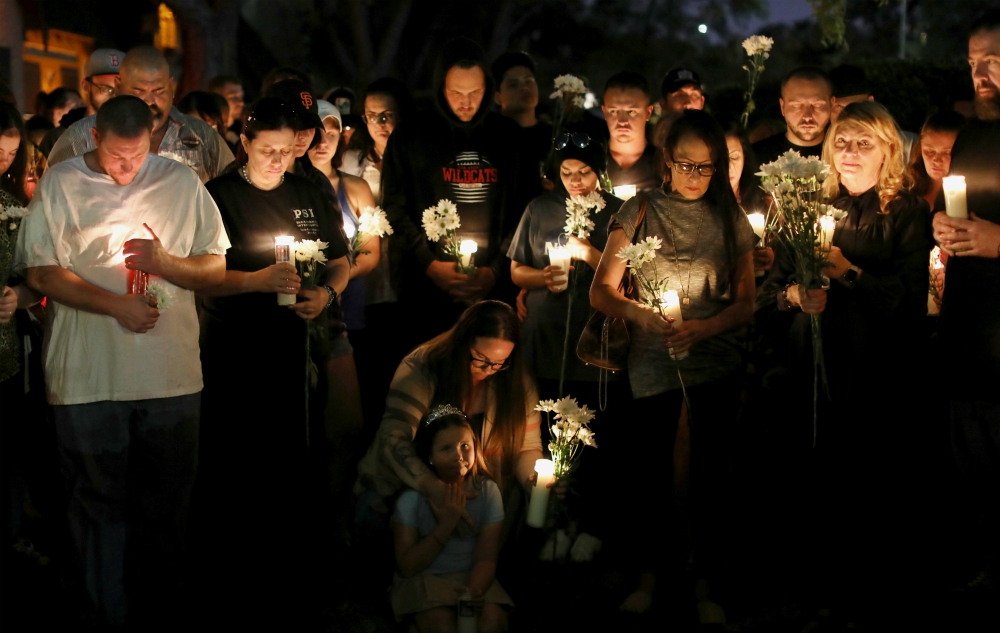
People attend a candlelight vigil Oct. 3 in memory of the victims of a mass shooting along the Las Vegas Strip. (CNS/Reuters/Mike Blake)
I was sitting the other day with a group of clergy: a couple of Roman Catholic priests, an imam, a rabbi and another half-dozen Protestants.
"I am burnt out," someone said out loud.
"I can't hold another candlelight service," chimed another.
A third said, "How long can we hop from one crisis after another?" His lament echoed the prophet Habakkuk from Scripture: "How long, O LORD, must I cry for help and you do not listen? Or cry out to you, 'Violence! and you do not intervene?' "
When Puerto Rico joins Houston in too much wind and rain, and Las Vegas joins Orlando in raining down too many gunshots, and wildfires — absent rain — take out some of the most beautiful country in the world, people notice. They go to their knees, not out of protest of racism but out of desperation.
At times, it seems like the fun places are getting hurt the most: concerts, dance clubs, wine country, the Caribbean.
How long can this go on?
People are demoralized by the amount of unnecessary suffering around them. They come to church, not really believing anybody has the answer but knowing they have to find one.
Why? Why are these things happening?
Surely one reason is the long-term abuse of our natural environment; Mother Nature is in a bad mood. Another reason, below the first, is why we continue to let that abuse happen. A third reason, underneath that one, is the fear of personal helplessness.
What can I possibly do about it now or tomorrow or even the next day?
Demoralized religious leaders, take note: It is through attending to people's feelings and fear of personal helplessness that we will be led out of our legitimate crisis fatigue.
Here, follow three do's and three don'ts as an open door out of our crisis fatigue. They are small, slow and steady, just like our personal response ought to be. They obey the rule of three, because not many of us can do more than three of anything at once.
Do:
- Pray. Really pray. Don't just light a candle or name the victims or send a contribution. Do all of those things as though you meant them. Do them every day for one person who has lost their home. Imagine him or her — maybe you already know someone, perhaps a next-door neighbor — and pray without ceasing. Add a phone call or a note or a mop to your prayer. Help someone get through the day.
- Write, call or email your congressperson every day about one aspect of climate change for which you want governmental intervention. Hound them. Don't go to sleep at night with the message to yourself that you did nothing. Do something.
- Tell the truth to your colleagues and friends. If you are burnt out, say so. Ask for help. Addiction is often defined as the inability to ask for help. If you ask for help, someone else might do the same.
Advertisement
Don't:
- Think about seven generations from now. Instead, join those who right now are trying to build long-term sustainable infrastructure in Puerto Rico. Notice the landmark lawsuit brought by 21 youths over the U.S. government's alleged failure to rein in fossil fuel development and address climate change. (A federal appeals court issued a temporary stay in July, after a federal district court in Eugene, Oregon, set a trial date for February.) Think about the rights children have to have grandchildren and to have safe and clean air and water. Don't think about doing them a favor; imagine their future.
- Forget to rest. If your problem is crisis fatigue or compassion fatigue or just plain fatigue, rest into it. Working harder, when demoralized, only causes more demoralization. We need people who have wrestled denial to the ground, not people who are exhausted by and in their denial.
- Mistrust God. God is not at the root of this mess — we are. God insists so powerfully on our freedom, and loves us so much, that God actually trusted the likes of us with freedom. Listen to what the Divine has in mind. Anne Lamott says, "Grace always bats last." Experience grace, not mistrust.
Looking back, I wish I had these thoughts that day when I met with my clergy group. Hopefully, they still can offer some assistance now.
[Donna Schaper is senior minister of Judson Memorial Church in New York City.]








